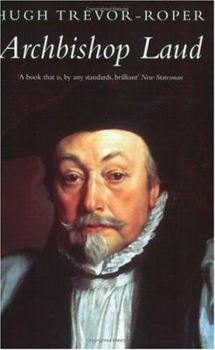Archbishop Laud
The most powerful man in England during the so-called "Eleven Years Tyranny" from 1629-1640, archbishop of Canterbury William Laud was thrown from power in 1640 and executed on Tower Hill during the... This description may be from another edition of this product.
Format:Paperback
Language:English
ISBN:1842122029
ISBN13:9781842122020
Release Date:June 2001
Publisher:Phoenix
Length:480 Pages
Weight:1.65 lbs.
Dimensions:1.5" x 6.2" x 9.2"
Customer Reviews
2 ratings
A socio-political idealist
Published by Thriftbooks.com User , 15 years ago
There is no reason to doubt that Laud was a deeply religious man. Even Trevor-Roper seems to recognize this at times, but the author paints the picture of a single minded and selfless bureacrat who is driven by a sociological ideal of restoring the post-Reformation church to its pre-Reformation glory. Theological convictions and religious ceremonies are humbug for Trevor-Roper's version of Laud. Laud's program is a social and practical one according to the author. Trevor-Roper finds it ironic that Anglo-Catholics would revere Laud and consider him a saint and a martyr since he was a "restless, practical bureaucrat." It is hard to see how alienating the middle class Puritans of the Midlands and East Anglia was practical, or how the attempted enforcement of Anglican liturgy upon the fiercely independent and Presbyterian Scots was anything short of madness. It is difficult to understand Laud if one does not take seriously his love for the "beauty of holiness." Trevor-Roper concedes that Laud has had his defenders, but that they have been clergymen who understand nothing more than Laud's theology and religious ceremonies. That Anglicans retain the correct posture of the communion table and other "insignificant cermonies" would not have cheered Laud's heart since his policies were a complete and utter failure. Trevor-Roper's assessment of Laud is akin to a biography of Che Guevarra that considers his commitment to the ideal of communism incidental. That said, I gave the book four stars because Trevor-Roper spares the reader the two extremes of Laud the intolerant religious bigot and Laud the saint and martyr.
Less Than the Whole Laud
Published by Thriftbooks.com User , 23 years ago
The mocking grace "To God much praise, and little laud to the Devil" reflected the opinion of many of William Laud's contemporaries - and also of several generations of Whig historians. To Macaulay and his ilk, Charles I's Archbishop of Canterbury was a stock villain, culpable for the royal policies that provoked the English Civil War.Hugh Trevor-Roper's biography (first published in 1940; Phoenix Press reprints the very slightly revised 1961 edition) cannot be called a rehabilitation, but it does correct, and has largely superseded, the Whig caricature. (The Britannica entry on Laud, for instance, reads like a precis.) Instead of a Wolsey-like grand prelate, Laud is shown to have been an honest, hardworking man, notable both for extensive charities and for fostering Greek, Arabic and Persian studies. His most conspicuous faults were personal rudeness, excessive severity as a judge (even by the severe standards of the time) and political maladroitness. Though he left behind many volumes of writings, he never grasped the importance of propaganda or public opinion. His immediate reaction to opposition was clumsy suppression, an instinct that led him to advocate the forcible imposition of episcopal governance on the Scottish church. From the failure of the "Bishops' War" followed the disintegration of Charles' personal rule, the Short and Long Parliaments, civil war and Laud's own murder by Act of Parliament in 1645.Trevor-Roper recounts Laud's career in, as one would expect, a lively and opinionated, yet thoroughly scholarly, fashion. He emphasizes high politics and ecclesiastical conflict but also directs attention to Laud's achievements as Chancellor of Oxford University, where his impact may have been more lasting than on either Church or State. There is little speculation about the Archbishop's private life, for which hardly any evidence survives. He never married, apparently kept no mistresses, lived unostentatiously and left behind almost no purely personal correspondence or anecdotes. Trevor-Roper surmises that he tended to have allies rather than friends, but the truth is unknowable.Excellent though it is in most respects, "Archbishop Laud" suffers from distortion in one key area. The biographer takes it as a fundamental truth that 17th Century men were as secular in outlook as his own 20th Century circle of acquaintances. Therefore, religious principles must have been mere masks for social and political content. Men adopted Puritan or Arminian or Roman Catholic theology because they liked the political doctrines associated with those labels.That premise is no doubt true of many figures of the day, but Trevor-Roper's own narrative exposes its dubiety in this particular case. The tenet that Laud advanced most persistently, in the teeth of massive opposition by both clergy and laity, was the importance of preserving continuity with the pre-Reformation Church. He was not sympathetic to Roman Catholicism but would not abandon t






